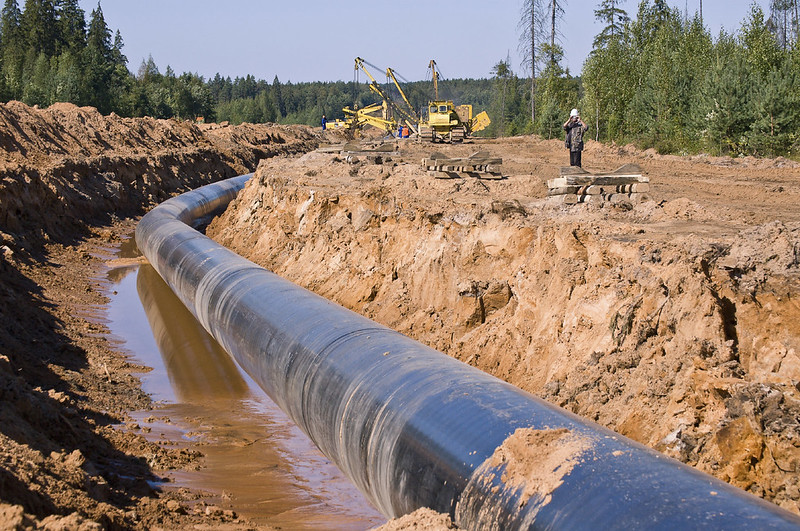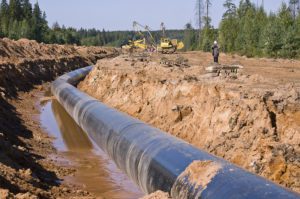
September 27, 2024 – For years, pipeline companies like Energy Transfer have built and operated dangerous pipelines throughout Pennsylvania, without adequate safety oversight. Now, new rules passed by the Pennsylvania Public Utilities Commission (PUC) go a long way to addressing safety and environmental concerns associated with hazardous, highly volatile liquids pipelines like Mariner East. While not perfect, these groundbreaking new rules put Pennsylvania at the forefront of safety – protecting homes, schools, and places we gather that are in close proximity to such pipelines.
These new rules are a direct result of the tireless work of residents and the legal and advocacy work of Clean Air Council and our partners. From contaminated wells to sinkholes to the potential for leaks and explosions, residents have raised the alarm on the dangers of hazardous liquids pipelines and the need for better regulation by state agencies. Clean Air Council has supported residents in their advocacy and legal efforts to challenge the weak regulation and enforcement that puts communities at risk. The new regulations cover construction, operation and maintenance, leak detection, emergency notification, accident reporting, and enforcement mechanisms.
The potential accidents and disasters associated with pipelines like Mariner East are unacceptable and we are confident that these new rules will be more protective and help us breathe a sigh of relief. While this is a significant victory, the Council will continue to watchdog the PUC and pipeline safety across the state. No one should be in harm’s way of any dangerous pipeline infrastructure.

PENNSYLVANIA (February 27, 2024) – On Saturday, the Pennsylvania Department of Environmental Protection (DEP) published the final guidance on using underground boring technology (“trenchless” technology) such as horizontal directional drilling (HDD) to build gas pipelines and other underground utilities. The guidance lays out a roadmap to less-risky pipeline construction practices. The guidance stems from a legal appeal of Mariner East II pipeline permits by Clean Air Council, Delaware Riverkeeper Network, and Mountain Watershed Association.
Also announced last week, the Pennsylvania Public Utility Commission (PUC) released a final rulemaking intended to improve safety in the construction and operation of pipelines, such as the Mariner East lines, transporting hazardous liquids through Pennsylvania. Hazardous liquids pipelines will now be subject to Pennsylvania-specific regulations as well as federal Pipeline and Hazardous Materials Safety Administration (PHMSA) regulations. These new regulations come after an in-depth review of pipeline safety measures in Pennsylvania, prompted in part by a lawsuit filed by residents before the PUC. The “Safety 7” lawsuit alleged that the safety risks associated with the Mariner East pipelines violated residents’ rights. Clean Air Council filed as an intervenor in safety-related cases before the PUC, and supported residents in their advocacy efforts to gain greater public safety protections. The new regulatory framework corrects some of the prior loopholes and lessens the risks to residents of the Commonwealth.
“DEP’s trenchless technology guidance and the PUC’s hazardous liquids safety rule are some of the strongest and most protective in the country when it comes to safeguarding the public and the environment,” said Alex Bomstein, Clean Air Council Legal Director. “Our commonwealth is overdue for these protections as fracking runs rampant and the industry clamors for more pipelines for transport. The Council will continue to watchdog the gas industry and ensure that these rules are followed and the public is protected.”
“Because Mariner East largely does not transport gas for energy production but “natural gas liquids,” which are used mostly for plastic production, it fell outside of many of the rules governing gas lines,” said Melissa Marshall, Mountain Watershed Association Community Advocate. “This lack of oversight caused countless harms and we hope this guidance will prevent such catastrophic damage in the future.”
Delaware County resident Rosemary Fuller, who was involved in the Safety 7 case, stated that, “hazardous liquid pipelines put residents at risk, especially when they run through densely populated areas, next to schools and hospitals, or through areas where residents source their drinking water from private wells, which are impacted by HDD drilling. The DEP and PUC rulemaking is long overdue, and these new regulations must be strictly enforced.”
The latest spill on the Mariner East pipeline system was reported this week in Marsh Creek State Park in Chester County where drilling fluid used during construction of the pipeline once again rose up in a wetland and flowed into a tributary to Marsh Creek Lake.
“This is just one example of how the damage to the environment doesn’t end when the drilling ends,” said Chester County resident Christina DiGiulio, “these corporations need to be held fully responsible for their crimes.”
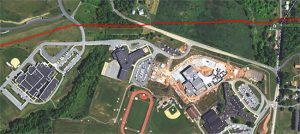
Chester County, PA (August 16, 2022) — Highly volatile hazardous liquids surge through the Mariner East pipeline system as it snakes through over 300 miles of Pennsylvania’s land. It passes by schools, under farms, and across streams. Existing lax regulations could not prevent Sunoco Pipeline L.P.’s reckless construction practices from creating sinkholes by homes and train tracks and contaminating residential water supplies, nor make Sunoco provide basic safety information to schools and communities in the zones threatened by potentially catastrophic leaks or explosions.
The Council, other local health and environmental groups, and impacted residents have worked tirelessly for years to protect the public and hold Sunoco accountable. We now applaud the Public Utility Commission (PUC) for stepping up with proposed common-sense rules to reduce the threat from hazardous liquid pipelines. Sunoco and other industry actors are trying to block the PUC’s proposed safety regulations, but the Council is meeting them at every turn, fighting Sunoco in court when local communities sue for relief, amplifying the voices of the public, and supporting the PUC’s invaluable efforts.
One of the most important proposed regulations would help prevent sinkholes and potential pipeline ruptures by requiring pipeline builders to look at the geology of a site before starting construction. Pennsylvania’s unique geology includes unstable limestone formations, called karst. These pipelines carry volatile gasses that are compressed under great pressure into liquid. If the pipelines rupture, heavier-than-air gasses would rapidly blanket the surrounding area, potentially suffocating anyone in range, and the slightest spark could ignite the highly flammable gasses. So, it seems obvious to avoid building where the ground might crumble away, leaving the pipeline unsupported. Yet Sunoco historically neglected to adequately check its construction sites, too often with disastrous results, and now fights this necessary rule.
The PUC also wants to require pipeline operators to provide local officials and emergency responders with the information they need to protect their communities in the event of an accident. The Council strongly supports providing all the information needed to local officials charged with protecting schools in the potential impact zone of a pipeline leak or other accidents. Previously, Sunoco provided such limited information to local community members that it left them quite unprepared for a pipeline disaster. For instance, the company left residents confused about when they should call “911” because a cell phone might produce a catastrophic spark.
The Legal Exposition
Buckle in for some legal exposition identifying what has happened and what still needs to happen before PUC’s proposed safety rules start protecting Pennsylvanians. Administrative regulations like these must go through several steps before being finalized, including opportunity for the public to submit comments. Here, the PUC decided to also invite a second round of comments to allow members of the public to respond to each others’ initial remarks. The rulemaking attracted comments from a wide range of interested parties, ranging from residents to local government officials to the American Petroleum Institute (the national trade association for the fossil fuel industry), and, of course, Sunoco.
In addition to raising public awareness during this process, the Council led a coalition of other knowledgeable public advocacy groups in drafting comments which (1) supported the PUC’s authority; (2) suggested ways to strengthen the proposed rules, including grounding the regulations in well established industry “best practices” which are too often ignored; and (3) bolstered the voices of local communities. In the second round, our coalition refuted the many baseless objections raised by Sunoco and their allies and provided further support for the concerns of local governments and nearby residents.
The comments and the proposed rules were then reviewed by Pennsylvania’s Independent Regulatory Review Commission (IRCC), as is standard. IRCC then prepared its own comments, referencing public comments and asking the PUC to conduct additional analysis.
What are the next steps
PUC must consider and publish a response to all of the comments before drafting a final form of the rules which it needs to send back to the IRCC. The PUC has two years from when the public comment period closed to complete the process, which makes the deadline May 12, 2024. IRCC will then discuss the rules at a public hearing and vote on whether the rules are “in the public interest.”
In the meantime, Clean Air Council will be part of the bulwark protecting the communities that brought successful challenges to some Sunoco’s harmful practices. Sunoco’s legal challenges to the PUC’s orders that resulted, combined with their public comments to the rulemaking, foreshadow their likely future judicial challenges to the safety rules. For instance, Pennsylvania law charges the PUC with ensuring that public utilities are operated safely and efficiently, making “every reasonable effort to warn and protect the public” from potential dangers. Sunoco argued strenuously for public utility status for its hazardous liquid pipelines because that allowed it to use the power of eminent domain to condemn private property to build its pipelines. Now it argues in public comments and in court that it should not need to accept the associated responsibilities. Astoundingly, in fighting these regulations Sunoco is essentially claiming that, in the event of a Sunoco-created pipeline emergency, it would be an unreasonable effort for Sunoco to 1) warn the officials in charge of keeping nearby school children safe, and 2) provide basic information public officials need to develop emergency-response plans to protect the children and others.
Clean Air Council will not let such claims stand. The Council will continue to fight Sunoco’s obstructionist, irresponsible behavior in court and through the regulatory process. It looks forward to reporting when the PUC’s new regulations are finalized and begin making Pennsylvania safer.
For more information, contact Annie Fox, Law Clerk at afox@cleanair.org.
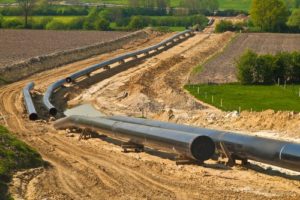
Dauphin County, PA (August 5, 2022) On Friday morning, Dauphin County Judge Edward Marsico presided over a plea agreement between Pennsylvania Attorney General Josh Shapiro and Sunoco / Energy Transfer, settling more than 40 criminal charges related to construction of the Mariner East pipelines. Energy Transfer did not contest charges related to criminal destruction of the environment and water resources of the Commonwealth as a result of construction of its Mariner East project, a pipeline project running the length of Southern Pennsylvania to transport gas byproducts to an export terminal on the Delaware River. In the more than five years of its ongoing construction, Energy Transfer has damaged and destroyed scores of water wells and other private and public resources across the state.
Clean Air Council has partnered with residents for years to resist Mariner East through education, advocacy and multiple legal actions. These efforts have resulted in increased scrutiny of Sunoco’s flawed science and stronger environmental protection policies.
Today’s plea bargain settles the case against Energy Transfer/ Sunoco for $10 million, a significantly larger sum than what could have been levied had the case gone to trial, given Pennsylvania’s weak environmental enforcement laws. The fine will be used to establish a statewide fund for improving the water in watersheds most impacted by the Mariner East project, and for compensating landowners along the pipeline that have sustained damage to their private wells. Impacted residents can have their water tested by emailing watertesting@attorneygeneral.gov prior to the August 19th deadline.
Joseph Otis Minott, Esq., Clean Air Council Executive Director and Chief Counsel, issued the following statement:
“After many years of deceiving the public, Energy Transfer is finally being brought to justice for criminal conduct. A pipeline that has had so many criminal violations of the law should not even be allowed to operate. And while today’s settlement cannot address all of the many harms of this pipeline, it offers a meaningful remedy for polluted well water and damaged watersheds. It is imperative that neighbors with impacted wells reach out to the Attorney General’s office right away to get their water tested.”
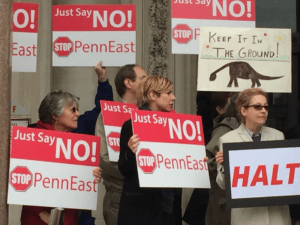
October 21, 2021 – Pennsylvania and New Jersey landowners woke up last week to news of the victory they have been working to accomplish over the last seven years: the PennEast pipeline, in a word, is dead. The company announced it would end development of its planned 118 mile, 36” diameter fracked gas pipeline from Luzerne County, PA to Mercer County, NJ.
PennEast had previously filed eminent domain proceedings against dozens of landowners in both states to build its dangerous and unneeded pipeline. For seven years, property owners in Pennsylvania and New Jersey faced lawsuits for asserting their private property rights and refusing to sell to PennEast pipeline. Hints of the pipeline’s impending demise came over the last several weeks as PennEast suddenly announced it would withdraw condemnation lawsuits against 70 property owners in Luzerne, Carbon, Monroe, Northampton and Bucks counties in Pennsylvania, and would similarly drop its plan to use eminent domain to acquire state-owned land in New Jersey.
The Council has opposed PennEast Pipeline from its inception investing time, community organizing, expertise, and legal resources into this fight. The Council:
- Called on the Delaware River Basin Commission (DRBC) and Governor Wolf to reject PennEast’s application.
- Urged the Pennsylvania Department of Environmental Protection (DEP) to hold meaningful public comment periods to assure that impacted community members would understand how the proposed pipeline would impact them.
- Participated in a scientific study by Cadmus Group to highlight the negative costs of the PennEast and Mariner East 2 pipelines on the Delaware River Basin’s ecosystems, economies, and population.
- Developed and submitted extensive technical and legal comments demonstrating to DEP the flaws in the proposed project permits.
- Sent federal agencies detailed comments explaining how the project was unneeded and harmful.
- Recruited our members to submit their own comments to state and federal agencies.
All that persistence has finally paid off.
In addition to preserving private property, residents and the Council have fought tirelessly for years to protect the 88 waterways, 44 wetlands, 30 parks, 33 conservation easements, and numerous exceptional value streams that PennEast would have crossed. The pipeline would have also plowed through some of the region’s most beloved conservation and recreation areas including Hickory Run State Park, Beltzville Lake, and Weiser State Forest.
PennEast is a private for-profit company that does not meet any public need. Its construction would have destroyed some of Pennsylvania’s most cherished natural resources and ecotourist areas, while its operation would have led to more fracking harms and climate-causing methane pollution. The end of PennEast is a huge victory for landowners, conservationists, and all those who recreate in our treasured state parks.
While the announcement is cause for celebration, lingering concerns remain as PennEast continues to make contradictory public statements about the possibility of moving ahead with a portion of the project in Pennsylvania only. This could pose a continued threat to conservation and recreation areas as well as streams, wetlands, and drinking water.
That is why Clean Air Council continues to work closely with our partners in Save Carbon County, New Jersey Conservation Foundation, Delaware Riverkeeper Network, Concerned Citizens Against the Pipeline, and Homeowners Against Land Takings (HALT) to ensure that this victory is final and permanent.
For more information contact Eve Miari, Advocacy Coordinator, emiari@cleanair.org
HARRISBURG, PA (June 30, 2021) We celebrated a big victory in mid-June with a court ruling that restored the rights of people across Pennsylvania to challenge fracked gas projects that threaten their health and their environment! Residents of Upper Bucks County and a local municipality, West Rockhill Township, had appealed a decision of the Pennsylvania Department of Environmental Protection granting an air pollution permit to the Adelphia Gateway Pipeline project for its Quakertown Compressor Station. The Adelphia Gateway Pipeline is a gas pipeline cutting through the Lehigh Valley and the Philadelphia suburbs. Compressor stations are large, polluting facilities that push the gas along the pipeline to its destination.
The Pennsylvania Environmental Hearing Board (EHB) had thrown out the appeals, saying that it didn’t have a right to hear them, and that only federal appeals courts could hear challenges to projects that are part of interstate gas pipelines. But the EHB is designed to make it simple for everyday people to file appeals. At the EHB, parties can bring new evidence to the judges and have a trial on the new evidence. Challenges to these projects in federal court can be more complicated and don’t allow the parties to put on new evidence and have a trial. The EHB decisions had kept the township and the residents from getting their day in court and threatened to keep other people from being able to exercise their rights to appeal harmful projects, too.
With Clean Air Council’s help, the parties appealed the EHB’s decisions to the Pennsylvania Commonwealth Court. The Commonwealth Court reversed the decisions, agreeing that federal law dealing with interstate gas pipelines did not conflict with state law giving people the right to take their appeals to the EHB. The residents and the township can now move ahead with their cases at the EHB challenging the dangerous Quakertown Compressor Station, and all Pennsylvanians’ rights have been protected!
For more information contact Alex Bomstein, Senior Litigation Attorney, abomstein@cleanair.org
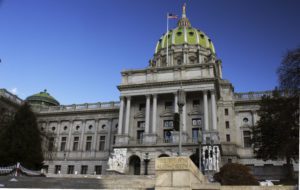
On Friday, Governor Wolf and the Department of Environmental Protection issued a ban on the issuance of water and earth-moving permits and approvals for Energy Transfer pipelines in Pennsylvania.
In response, Joseph Otis Minott, Esq. Executive Director and Chief Counsel of Clean Air Council, issued the following statement:
“The ban on new permits to Energy Transfer is the kind of leadership on pipelines that the public has been waiting for from Governor Wolf. This was a crucial step to protect the public from a company with a track record of environmental destruction, public safety disasters, and deception. The next logical step is to stop the operation of ET’s Mariner East pipelines for good.”
Click here to read the full press statement from Governor Wolf
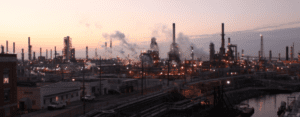
[PHILADELPHIA, PA – September 20, 2018] Today, the Kleinman Center for Energy Policy released “Beyond Bankruptcy: The Outlook for Philadelphia’s Neighborhood Refinery,” a report that raises concerns about contamination at the Philadelphia Energy Solutions (PES) refinery site and highlights the utter lack of public participation in the remediation planning process.
According to the report, Sunoco did not follow the required public participation process for remediation planning, as local residents, city agencies, elected officials, and other stakeholders were not able to provide input. The Pennsylvania Department of Environmental Protection (DEP) has already approved Sunoco’s analysis of contamination for eight of the eleven refinery sites deemed an “area of concern,” meaning Sunoco may comply with weaker pollution standards.
Joseph Otis Minott, Esq., Executive Director and Chief Counsel of Clean Air Council, issued the following statement:
“Sunoco has unlawfully denied local residents, city agencies, elected officials, and other stakeholders the opportunity to meaningfully provide input during the remediation planning process for the PES refinery site. The lack of public participation in planning for remediation at the site is completely unacceptable, especially given the extensive environmental contamination at the site and the proximity of the refinery to environmental justice neighborhoods. As PES is likely to go bankrupt again in the near future, it is critical that the city engage the public in thoroughly assessing the best possible future use of the refinery site that aligns with Philadelphia’s sustainability goals.”
###
Clean Air Council is a member- supported, non-profit environmental organization dedicated to protecting everyone’s right to a healthy environment. The Council is headquartered in Philadelphia and works through public education, community advocacy, and government oversight to ensure enforcement of environmental laws. For more information, please visit www.cleanair.org.
PHOTO: Kleinman Center for Energy Policy
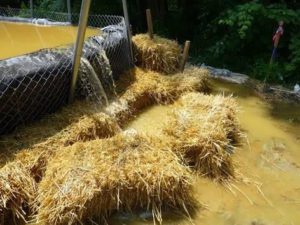
After a slew of legal filings, briefs, and hearings before two different courts, the Environmental Hearing Board, on Monday, April 16th, ordered stronger protocols for responding to and preventing drilling fluid spills on the Mariner East pipelines. Clean Air Council, Delaware Riverkeeper Network, and Mountain Watershed Association took Sunoco and the Pennsylvania Department of Environmental Protection (DEP) to court for violating a previously agreed-upon version of the protocols, and then quietly modifying those protocols without the input of the Council, other organizations, or the court.
The history of these protocols, called the Horizontal Drilling Inadvertent Return Assessment, Preparedness, Prevention and Contingency Plan (or HDD Plan for short) is somewhat complicated. The HDD Plan was originally part of the water permits DEP issued to Sunoco for the Mariner East 2 pipelines in February 2017. In August 2017, after a torrent of drilling fluid spills and drinking water contamination incidents made clear that the February 2017 HDD Plan was failing to protect the public and the environment, Clean Air Council and its partners filed an emergency motion with the court. This resulted in the court shutting down Sunoco’s drilling Mariner East 2 drilling operations until the parties agreed to improvements to the HDD Plan in August 2017. Fast forward six months, and DEP and Sunoco walked back some of those protections in a side agreement. Clean Air Council and its partners filed another emergency filing and have ultimately secured the most protective HDD Plan yet. And this time the stakes are higher if there are further violations.
The new HDD Plan accomplishes several important things. First, it now applies to all drilling methods that could result in drilling fluid spills. Second, professional geologists must be involved in determining whether it is safe to proceed with drilling after a spill. The new HDD Plan lays out specific requirements for what the professional geologist must investigate and present to the DEP. DEP then must find that any plans for continued drilling at the spill site adequately protect the public and the environment before it allows drilling to restart. Groundwater protections have been spelled out in detail so there can be no ambiguity in how they are applied; they are key because of the damage Sunoco’s operations has already caused to drinking water supplies and the continuing nature of that threat. Requirements for notifying DEP and the public about drilling incidents have also been improved.
There will also be increased transparency so landowners and other concerned members of the public will be better able to track any future spills that may arise: Reports prepared by Sunoco’s geologists will be shared with Clean Air Council and its partners. DEP’s documentation of spills on its website will be expanded, made uniform, and include more detail about spill locations–a key piece of information that had previously been missing.
The new HDD Plan is comprehensive, strongly protective, and scientifically rigorous. Perhaps just as important, the Environmental Hearing Board has made it crystal clear that it will not tolerate Sunoco and DEP trying to change it behind the backs of the public again. Even with these improvements, Clean Air Council is under no illusion that the new HDD Plan will be a silver bullet against all future problems and we believe it is still important to keep a watchful eye on construction operations.
You can view the new, April 2018 version of the HDD Plan here
Photo by Faith Zerbe/Delaware Riverkeeper Network
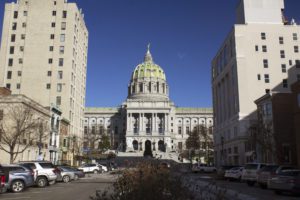
FOR IMMEDIATE RELEASE:
December 14, 2017
Contact:
Justin Wasser, Clean Air Council: 814-242-3156
Impacted Residents, Health Experts and Environmental Advocates Urge Gov. Wolf to Advance Methane Pollution Standards for the Natural Gas Sector
Harrisburg, PA (December 14, 2017)- The Pennsylvania Department of Environmental Protection (DEP) presented today the final draft of permits to control methane pollution from new and modified natural gas operations to the Air Quality Technical Advisory Committee (AQTAC). Residents affected by natural gas operations, as well as environmental and public health advocacy groups from across the Commonwealth, spoke at a press conference and at the AQTAC meeting during the public comment period. The comments were a continuation of advocacy that has spanned three years urging Governor Wolf to fulfill his campaign promises on methane controls. Wolf first promised to cut methane pollution from all new and existing gas operations on the campaign trail in 2014. He announced his methane reduction strategy in January 2016.
Environmental and public health advocacy groups and impacted residents were pleased to finally see progress made on the methane reduction plan at the meeting, but say that the Wolf administration must quickly finalize general permits and require companies to comply with them. Groups raised concerns about the administration’s proposed concepts for weaker rules covering existing source of methane pollution — a major departure from what the governor promised to do.
“While the progress being made on methane standards covering new natural gas sources is encouraging, the Wolf administration must move quickly to regulate existing sources in a similar way,” said Joseph Otis Minott, Executive Director and Chief Counsel of Clean Air Council. “What DEP is proposing to implement on existing sources is the bare minimum required by law. Governor Wolf must go well beyond the bare minimum in protecting the health of Pennsylvania citizens. We elected this governor based on his promises to be a leader in addressing methane pollution and climate change. Pennsylvanians deserve that leadership.”
Methane, a very potent greenhouse gas, is accompanied by air pollutants harmful to human health when it leaks from natural gas operations. Emissions in Pennsylvania continue to rise year after year.
The standards for new and modified sources will be implemented through two general permits, which allow for a streamlined approval process if industry operators agree to adhere to the permit conditions. One permit, GP-5A, covers unconventional gas wells and pigging operations and the other, GP-5, covers processing plants and compressor stations, including those on large transmission pipelines.
“Comprehensive methane rules for existing sources of pollution must be broader in scope and more stringent than the requirements found in EPA guidelines,” said Robert Routh, staff attorney for Clean Air Council. “These guidelines represent the national floor. Governor Wolf and DEP need to lead here and aim much higher for the sake of all Pennsylvanians.”
“The citizens of the commonwealth are suffering needlessly when we have the tools and technology available to greatly limit methane pollution and help clean our air,” said Dr. Robert Little, a family physician and president of the Harrisburg/Hershey chapter of Physicians for Social Responsibility. “It bears emphasizing that we need to clear our air of both toxic hydrocarbons and emissions of methane – reducing one kind of pollution without the other gets us nowhere.”
“Until these new source rules are applied to existing sources, people in my community and others dealing with methane pollution right now are still looking at an unfulfilled promise by Governor Wolf,” said Lois Bower-Bjornson, an impacted resident of Washington County, PA. “I am urging Governor Wolf to be that leader who campaigned on a promise of holding the natural gas industry accountable to the people of Pennsylvania and move forward on rules for existing sources of methane pollution and VOCs immediately.”
“Today, my children and 3,200 of their classmates are attending school next to a gas well pad roughly half a mile away exposing them to a known health and safety risk from oil and gas air pollution including emissions of methane and volatile organic compounds,” said Patrice Tomcik, a mother of two sons from Butler County and a Field Consultant with Moms Clean Air Force, a 1 million member strong organization. “Let’s be clear: This problem will not be resolved unless and until DEP addresses these toxic pollutants like benzene, as well as methane emissions.”
